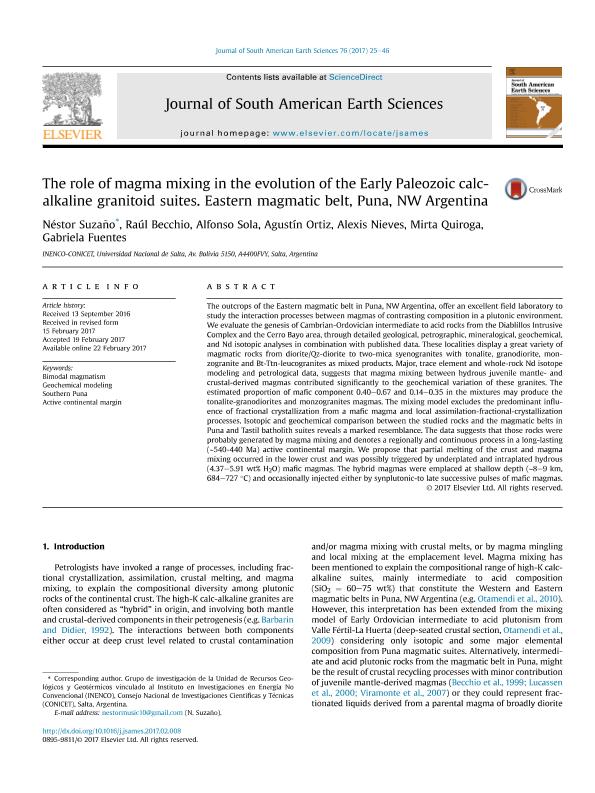Mostrar el registro sencillo del ítem
dc.contributor.author
Suzaño, Nestor Omar

dc.contributor.author
Becchio, Raul Alberto

dc.contributor.author
Sola, Alfonso Manuel

dc.contributor.author
Ortiz Yañez, Agustín

dc.contributor.author
Nieves, Alexis Iván Angel

dc.contributor.author
Quiroga, Mirta Fátima

dc.contributor.author
Fuentes, María Gabriela

dc.date.available
2018-11-23T21:27:05Z
dc.date.issued
2017-07
dc.identifier.citation
Suzaño, Nestor Omar; Becchio, Raul Alberto; Sola, Alfonso Manuel; Ortiz Yañez, Agustín; Nieves, Alexis Iván Angel; et al.; The role of magma mixing in the evolution of the Early Paleozoic calc-alkaline granitoid suites. Eastern magmatic belt, Puna, NW Argentina; Pergamon-Elsevier Science Ltd; Journal of South American Earth Sciences; 76; 7-2017; 25-46
dc.identifier.issn
0895-9811
dc.identifier.uri
http://hdl.handle.net/11336/65089
dc.description.abstract
The outcrops of the Eastern magmatic belt in Puna, NW Argentina, offer an excellent field laboratory to study the interaction processes between magmas of contrasting composition in a plutonic environment. We evaluate the genesis of Cambrian-Ordovician intermediate to acid rocks from the Diablillos Intrusive Complex and the Cerro Bayo area, through detailed geological, petrographic, mineralogical, geochemical, and Nd isotopic analyses in combination with published data. These localities display a great variety of magmatic rocks from diorite/Qz-diorite to two-mica syenogranites with tonalite, granodiorite, monzogranite and Bt-Ttn-leucogranites as mixed products. Major, trace element and whole-rock Nd isotope modeling and petrological data, suggests that magma mixing between hydrous juvenile mantle- and crustal-derived magmas contributed significantly to the geochemical variation of these granites. The estimated proportion of mafic component 0.40–0.67 and 0.14–0.35 in the mixtures may produce the tonalite-granodiorites and monzogranites magmas. The mixing model excludes the predominant influence of fractional crystallization from a mafic magma and local assimilation-fractional-crystallization processes. Isotopic and geochemical comparison between the studied rocks and the magmatic belts in Puna and Tastil batholith suites reveals a marked resemblance. The data suggests that those rocks were probably generated by magma mixing and denotes a regionally and continuous process in a long-lasting (∼540-440 Ma) active continental margin. We propose that partial melting of the crust and magma mixing occurred in the lower crust and was possibly triggered by underplated and intraplated hydrous (4.37–5.91 wt% H2O) mafic magmas. The hybrid magmas were emplaced at shallow depth (∼8–9 km, 684–727 °C) and occasionally injected either by synplutonic-to late successive pulses of mafic magmas.
dc.format
application/pdf
dc.language.iso
eng
dc.publisher
Pergamon-Elsevier Science Ltd

dc.rights
info:eu-repo/semantics/openAccess
dc.rights.uri
https://creativecommons.org/licenses/by-nc-nd/2.5/ar/
dc.subject
Active Continental Margin
dc.subject
Bimodal Magmatism
dc.subject
Geochemical Modeling
dc.subject
Southern Puna
dc.subject.classification
Meteorología y Ciencias Atmosféricas

dc.subject.classification
Ciencias de la Tierra y relacionadas con el Medio Ambiente

dc.subject.classification
CIENCIAS NATURALES Y EXACTAS

dc.title
The role of magma mixing in the evolution of the Early Paleozoic calc-alkaline granitoid suites. Eastern magmatic belt, Puna, NW Argentina
dc.type
info:eu-repo/semantics/article
dc.type
info:ar-repo/semantics/artículo
dc.type
info:eu-repo/semantics/publishedVersion
dc.date.updated
2018-10-22T17:28:20Z
dc.journal.volume
76
dc.journal.pagination
25-46
dc.journal.pais
Estados Unidos

dc.description.fil
Fil: Suzaño, Nestor Omar. Consejo Nacional de Investigaciones Científicas y Técnicas. Centro Científico Tecnológico Conicet - Salta. Instituto de Investigaciones en Energía no Convencional. Universidad Nacional de Salta. Facultad de Ciencias Exactas. Departamento de Física. Instituto de Investigaciones en Energía no Convencional; Argentina
dc.description.fil
Fil: Becchio, Raul Alberto. Consejo Nacional de Investigaciones Científicas y Técnicas. Centro Científico Tecnológico Conicet - Salta. Instituto de Investigaciones en Energía no Convencional. Universidad Nacional de Salta. Facultad de Ciencias Exactas. Departamento de Física. Instituto de Investigaciones en Energía no Convencional; Argentina
dc.description.fil
Fil: Sola, Alfonso Manuel. Consejo Nacional de Investigaciones Científicas y Técnicas. Centro Científico Tecnológico Conicet - Salta. Instituto de Investigaciones en Energía no Convencional. Universidad Nacional de Salta. Facultad de Ciencias Exactas. Departamento de Física. Instituto de Investigaciones en Energía no Convencional; Argentina
dc.description.fil
Fil: Ortiz Yañez, Agustín. Consejo Nacional de Investigaciones Científicas y Técnicas. Centro Científico Tecnológico Conicet - Salta. Instituto de Investigaciones en Energía no Convencional. Universidad Nacional de Salta. Facultad de Ciencias Exactas. Departamento de Física. Instituto de Investigaciones en Energía no Convencional; Argentina
dc.description.fil
Fil: Nieves, Alexis Iván Angel. Consejo Nacional de Investigaciones Científicas y Técnicas. Centro Científico Tecnológico Conicet - Salta. Instituto de Investigaciones en Energía no Convencional. Universidad Nacional de Salta. Facultad de Ciencias Exactas. Departamento de Física. Instituto de Investigaciones en Energía no Convencional; Argentina
dc.description.fil
Fil: Quiroga, Mirta Fátima. Consejo Nacional de Investigaciones Científicas y Técnicas. Centro Científico Tecnológico Conicet - Salta. Instituto de Investigaciones en Energía no Convencional. Universidad Nacional de Salta. Facultad de Ciencias Exactas. Departamento de Física. Instituto de Investigaciones en Energía no Convencional; Argentina
dc.description.fil
Fil: Fuentes, María Gabriela. Consejo Nacional de Investigaciones Científicas y Técnicas. Centro Científico Tecnológico Conicet - Salta. Instituto de Investigaciones en Energía no Convencional. Universidad Nacional de Salta. Facultad de Ciencias Exactas. Departamento de Física. Instituto de Investigaciones en Energía no Convencional; Argentina
dc.journal.title
Journal of South American Earth Sciences

dc.relation.alternativeid
info:eu-repo/semantics/altIdentifier/url/http://www.sciencedirect.com/science/article/pii/S0895981116301845
dc.relation.alternativeid
info:eu-repo/semantics/altIdentifier/doi/https://doi.org/10.1016/j.jsames.2017.02.008
Archivos asociados
